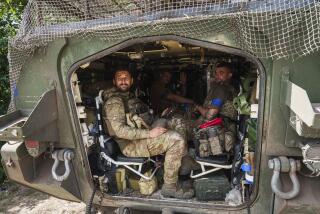Turkish General Vows to Crush Rebel Kurds : Iraq: Ankara’s forces are confident that their latest foray across border is taking its toll.
- Share via
CHIYAKERI, Iraq — From a 10,000-foot promontory in the mountains of northern Iraq, a hardened Turkish commander determined to crush rebel Turkish Kurd guerrillas surveyed the smoke from a dozen battlefield fires Sunday.
“If we have to come in 25 times, we’ll do it,” said Brig. Gen. Osman Pamukoglu, pointing to the maze of ravines, snowcapped peaks and escarpments that his troops were still combing for rebels on the fifth day of their cross-border “Operation Raiders” offensive.
Rebel shell casings littered the stony ground as soldiers kept their binoculars trained on the bushes around the Chiyakeri peak, about 10 miles inside Iraq. Thick smoke rose from the scene of continued fighting around four main camps of Turkey’s rebel Kurdistan Workers Party, or PKK, which has been fighting for autonomy in southeastern Turkey since 1984.
“As soon as a rocket hits the hillside, it starts a fire. It’s 100 degrees on the ground. This place is wild, a terrible place to fight,” said Pamukoglu, 47, commander of the operation that he said pits 3,000 Turkish mountain commandos against about 600 Turkish Kurd rebels.
None of the smoke appeared to be coming from Iraqi Kurd villages, most of which seemed to be south of the main battle zone and still in ruins after being dynamited during years of conflict with the army of Iraqi President Saddam Hussein. Iraqi Kurds, however, say that 3,000 of their people have been forced to flee the latest Turkish offensive.
The general said that so far 110 Kurdish rebels and 15 of his men have been killed.
A sorry selection of captured rebel weapons was displayed outside his headquarters: chipped grenades, loose ammunition, commercial walkie-talkies, World War II-vintage bolt-action carbines and battered Kalashnikov rifles from practically every country in the old Soviet bloc.
Turkish officials are characterizing Operation Raiders as a small-scale replay of Operation Steel, which lasted six weeks in March and April and involved 35,000 Turkish troops. European governments have so far made few of the warnings that accompanied Operation Steel, and the United States has voiced its understanding for the operation by its North Atlantic Treaty Organization ally, saying that the PKK is a terrorist organization.
Iraq has fiercely criticized Turkey’s action, calling it a “flagrant violation of Iraqi sovereignty,” even though Baghdad accepted Turkish “hot-pursuit” raids in 1986.
“People should understand that we do not want this land. We just want to clean out the terrorists who are here. Just along this stretch of border in the past 60 days, we had 36 attacks and 26 of my men died,” Pamukoglu said. “Operation Steel was to break their organization’s infrastructure. Operation Raiders is hit and run. This time, we surprised them. We marched in all night and hit them from behind as well as in front.”
The major in charge of the Chiyakeri unit said he had walked at least 60 miles in four days. He attributed his troops’ success to muscle power, and said that he had benefited from recent training by U.S. Rangers.
U.S. hardware has also had an impact. Pilots are proud of their U.S.-made Black Hawk helicopters. Troops say they have been backed up well by Cobra helicopter gunships, which can be heard by their targets only when they are less than two minutes away. Turkish officers say better training has also helped turn the 11-year-old struggle in Turkey’s favor.
“I feel there are less PKK these days. They want to operate on the frontier with Iraq and Iran, and less inside Turkey proper. Not much happens inside the border these days,” the major said.
“We have cut down the tree. Now we are lopping off the branches,” the general said.
A helicopter ride over the Turkish side of the mountains showed the effects of the campaign. Some Turkish Kurd villagers could be seen scything wheat from any fertile hollows in the bare, stony valleys, but more remote villages have been emptied by the fighting, with roofs apparently blown off by Turkish soldiers to prevent the rebels from using them for shelter.
Pamukoglu dismissed foreign criticism and debate about whether local support for the PKK rebellion translates into terrorism. Some diplomats and human rights groups believe the support is a product of the Turkish state’s repression of cultural and political freedom for its 12 million ethnic Kurds, about one-fifth of Turkey’s population.
“Foreign powers just want to keep Turkey down,” he shouted over the roar of the helicopter’s engines. “What I want to know is what the United States or [anyone] else would do different if they had borders like these.”
More to Read
Sign up for Essential California
The most important California stories and recommendations in your inbox every morning.
You may occasionally receive promotional content from the Los Angeles Times.













